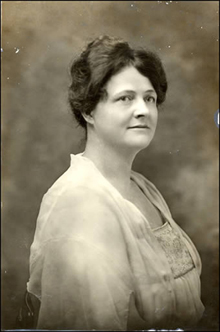On Violence in the South: Jessie Daniel Ames
On Violence in the South: Jessie Daniel Ames
As a response to violence and the issues it raises, and how people have opposed it, the Center will be running a series of entries from the New Encyclopedia of Southern Culture volume on Violence, published in 2011. Today, an entry on Jessie Daniel Ames by Marie S. Jemison. Yesterday, we featured the entry on Ida B. Wells-Barnett.

Ames, Jessie Daniel
(1883–1972) Social reformer.
Jessie Daniel Ames, born 2 November 1883, had moved three times in Texas by the time she was a teenager. Her father, a stern Victorian eccentric, migrated from Indiana to Palestine, Tex., where he worked as railroad station master, and in 1893 the Daniels moved to Georgetown, Tex., the site of Southwestern University, from which Ames later graduated.
The brutal Indian Wars and vigilantism of the period created a violent atmosphere, which strongly affected the sensitive young Jessie. A strong-willed child, she had resisted the perfect table manners expected of her and often was sent to the kitchen. In the Daniel kitchen young Jessie heard about a lynching nearby in Tyler, an event she remembered for years and that influenced her lifelong efforts to abolish lynching.
In June 1905 Jessie Daniel married a handsome army surgeon, Roger Post Ames, who later died in Guatemala. In 1914 she rose to prominence in Texas as an advocate of southern progressivism and women’s suffrage. Unlike most suffragists in the early 1920s, she understood the grave injustice against blacks in this country. She served as a vital link between feminism and the 20th-century struggle for black civil rights.
In 1924 she became field secretary of Will Alexander’s Atlanta-based Commission on Interracial Cooperation. She immediately began organizing against lynching in Texas, Arkansas, and Oklahoma. Alexander brought her to Atlanta in 1929 as Director of Women’s Work for the Commission, and in 1930 she began Southern Women for the Prevention of Lynching, which in nine years had 40,000 members. Alerted by friendly law officers and her contacts in the press when a lynching threatened, Ames contacted women in that county who had pledged to work against violence. Her work was not always appreciated. Opposition came from women as well as men. The Women’s National Association for the Preservation of the White Race claimed that Ames’s women “were defending criminal Negro men at the expense of innocent white girls.”
Ames did not support the federal antilynching law in 1940 as being practical. She said the bill would pass the House and southern senators would then defeat it. She was soon at odds with her boss, Dr. Alexander, as well as her old allies in the NAACP.
From May 1939 to May 1940 in the South, for the first time since records had been kept, not a single lynching occurred. World War II, however, dealt a death blow to Southern Women for the Prevention of Lynching, just as it did to the attempt to abolish the hated poll tax in the South. The alliance between women and victimized blacks, which Ames hoped for, was postponed.
In 1943 Southern Women for the Prevention of Lynching was absorbed by the newly formed Southern Regional Council, as was the Interracial Commission. Ames wanted to work for the new agency but found her services were not needed.
In the foothills of the Blue Ridge Mountains Ames set about to rebuild her life. Elected superintendent of Christian Social Relations for the Western North Carolina Conference of the Methodist Church, she welcomed the opportunity “to get back into public life and be remembered.” She later returned to Texas and was honored in the 1970s as a pioneer who combined feminism with civil rights activism. Jessie Daniel Ames died on 21 February 1972 at the age of 88.
Marie S. Jemison
Birmingham, Alabama
Jessie Daniel Ames Papers, Texas Historical Society, Dallas, Texas State Library, Austin, and Southern Historical Collection, University of North Carolina, Chapel Hill; Jacquelyn Dowd Hall, Revolt against Chivalry: Jessie Daniel Ames and the Women’s Campaign against Lynching (1979); Association of Southern Women for the Prevention of Lynching and the Commission on Interracial Cooperation Papers, Trevor Arnett Library, Atlanta University; Jon D. Swartz and Joanna Fountain-Schroeder, eds., Jessie Daniel Ames: An Exhibition at Southwestern University (1986).
